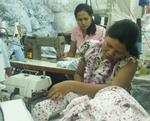"but you can't eat rights": Mamma Cash's guide to economic justice
type=blog
Mamma Cash is an international organization giving grants to women and transgender led projects. Here's an article by Gisela Dütting and Esther Vonk on why economic justice issues must be central to our feminist work. It covers what is meant by economic justice, why is it so urgent, and what the most important issues are. For them economic justice includes:
* equal rights, equal opportunity, equal wages
* fair working conditions
* economic independence and economic security
* economic participation
* mobility
* access to fairly paid work
* control over money and resources
* universal access to basic services
* sustainable and just economy
* an end to inequitable international economic relationships
Why now?
The number of women who live in poverty continues to grow. The current trends of globalisation and migration, an increasingly flexible labour market and the growth in the informal economy often have negative consequences for women and are among the important reasons for the increasing number of women living in poverty. Of all the people in the world living in poverty, 70% are women, and women earn only 5% of all earned income, even though increasing numbers of women do paid work. Worldwide, there are many more women doing paid work - in both formal and informal sectors of the economy - than ever before.
So it is logical that women's movements are giving economic justice a prominent place on their agendas. We also continue to see more initiatives by women in the struggle for economic justice. Mama Cash supports these initiatives as much as possible; the website features articles about several examples of projects we have funded.
We still know too little
These new circumstances demand new feminist strategies. Theoretical and political insights and analysis that are relevant for the women's movement are evolving. The trick is to take these insights and translate them into concrete strategies. It is one of the challenges facing Mama Cash. The following points briefly identify some of the key discussions that are important for the development of our future policy.
Strategic struggle or concrete action?
The women's movement is not an academic debating society. We urgently need to see concrete change. The question is how can we work most effectively? Should we continue with the strategic struggle for women's economic rights that began in the 1990s? Do we support the many concrete initiatives against economic injustice that women have undertaken at the local level based on their local circumstances? Or should we strive to combine both of these approaches?
Working on all levels
Working to secure an economically just world takes place on many different levels. The fight unfolds in the workplace and on the factory floor, but also at a policy level with the most influential financial institutions.
Women's movements have experience with gender-specific aspects of work and the concrete problems that women face in the workplace. These movements are fighting all over the world for maternity leave, for other employment benefits, and for a voice in labour unions. But there are also women's groups working on an entirely different level. They are concerned with unfair trade agreements and the effects of World Bank policies, for instance, on the position of women.
Important work is being done on both of these levels, but the relationship between the two is often not recognised. We need to ‘connect the dots' and make the ‘missing link'. By looking at the relationships between different types of activism and the strategic implications of both approaches, we can develop new feminist perspectives about the economy.
Economic justice and migration
Half of the migrants in the world today are women. The most important reason to migrate is the hope for a better economic future and a better life. Migrant women's groups are standing up for their rights, yet at the same time, the rights of migrants in general are not secure. There are many questions about citizenship, class and solidarity that have not yet been answered, and debates about economic migrants' access to public services are prominent on the political agenda in many countries.
Unpaid and informal work
Why is ‘traditional women's work' not paid, or only infrequently paid, and what would a more justly structured economy look like? This is an updated version of an old question. The current discussion is intensifying around the issues of domestic household labour - who does the work, is it paid or unpaid, does it takes place formally or informally, and what is the status of the people (mostly women) who are doing it? Another related issue is the phenomenon of economic sectors that are informal and dominated by criminal enterprises.
Sweatshops and human trafficking are well known examples. In these situations, it is less likely that workers will be paid and have access to social services, while multinational corporations and criminal networks make enormous profits. The question is what strategy the women's movement can best use to bring about change.
More attention to economic justice
Since its founding, Mama Cash has supported groups working to improve the economic position of women. With the Economic Justice Fund, we are giving added emphasis to the issue of economic justice.
http://www.mamacash.org
- redchidgey's blog
- Login or register to post comments

